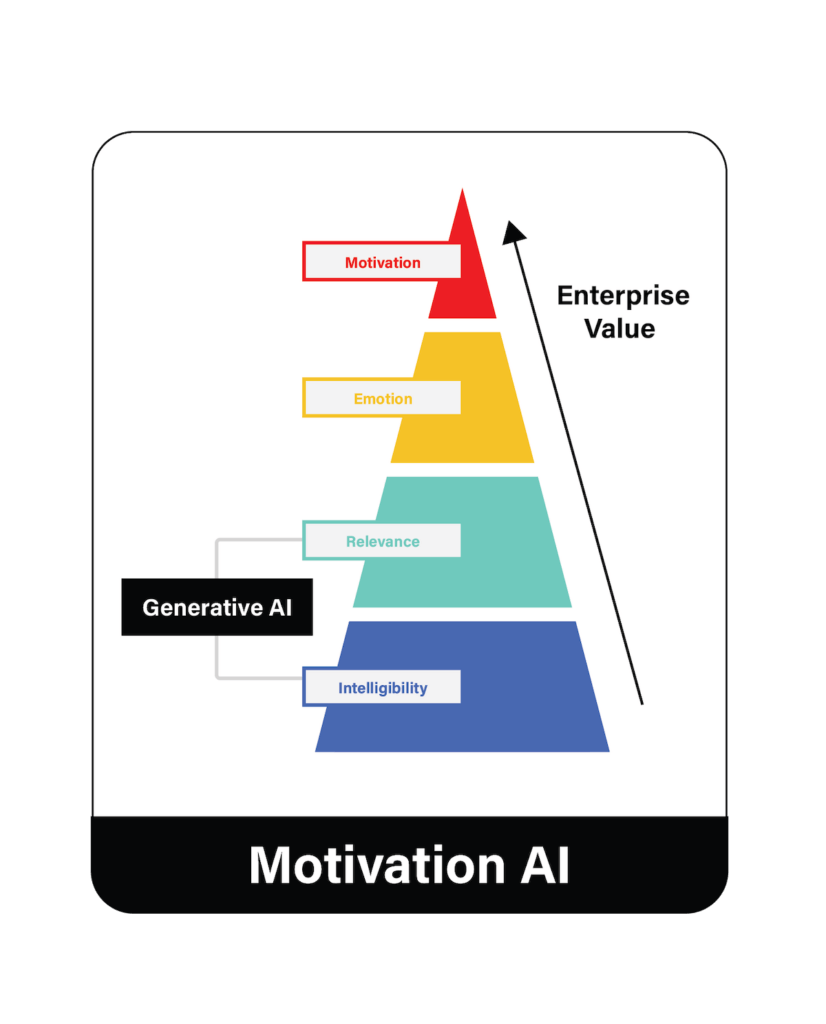
Marketing personalization is a dynamic, data-driven approach to digital marketing. Brands implement marketing personalization using multiple data points based on customer behavior, buying history, preferences, and interests.
Brands use this information to personalize emails, product recommendations, website experiences, and more to provide customers with personalized messaging and customer experiences that cater to their changing needs and motivate them to take action. Relevancy and value are at the center of great personalization strategies.
Sarah Coles, VP of Strategy at Persado, sat down with guest speaker Brendan Witcher, VP & Principal Analyst, Digital Business Strategy at Forrester Research and co-author of Conditional Love: What It Really Takes To Keep Customers Faithful for a webinar on Personalization 2.0: How to Differentiate Your Brand Using Data, Generative AI, and Experiences to share more about what marketing personalization is and how brands achieve it.
Are brands getting marketing personalization right?
The short answer is no. According to Brendan’s presentation on the webinar, retailers and brands win the personalization game by delivering relevancy and value to their customers. But, due to a lack of the right data or generalized opinions about what personalization is and who their customers are, many organizations still aren’t providing relevancy or value from their personalization efforts. Brands across various industries still put the customer’s name in an email or on the website and call it personalization. But, as Brendan stated in an example, if achieving personalization at scale were that simple, every company’s sales would go up 5% just by adding the customer’s name to an email. While it’s nice to call a customer by name or send them a coupon code for their birthday, it doesn’t actually add value or differentiate the brand in the marketplace.
Personalization is no longer just a buzzword, but a game changer in today’s competitive e-commerce landscape. According to a survey by McKinsey on personalization, 71% of consumers expect companies to deliver personalized interactions, and 76% get frustrated when it doesn’t happen. Consumers crave personalization. However, it’s clear that not all brands are getting it right.
Brands achieve relevancy by showing their customers content or products they actually want to see and providing them with the unique shopping experiences they want to have. When brands deliver relevancy, they show customers that they actually know them and care about their customer experience. Relevancy also drives customer loyalty as it adds a level of seamlessness and convenience to the customer experience that keeps customers coming back.
Relevancy matters because of its potential to increase the value a customer receives from a brand. For example, a consumer might find a product relevant, but if a big sale only applies in-store, then brands aren’t giving value to online shoppers or customers who don’t live near a store. Or if brands promote deals for products or experiences that aren’t relevant to a customer’s interests or lifestyle, they will fail to deliver value no matter how great the deal or discount is. Brendan explored this concept in the webinar.
Another thought-provoking concept Brendan brought up in the webinar was that much of what companies consider personalization stem from corporate opinions of who the customers are and what they actually want. But, it isn’t up to the company to determine what personalization is. It’s up to the consumer.
Do brands know their customers well enough to create marketing personalization?
Unfortunately, not. One of the most common mistakes brands make is treating customers as personas. As Brendan pointed out in the webinar, brands often define people by simple demographics such as male vs. female. They make sweeping generalizations based on gender, age, geography, etc. The truth is that people are far more complex than the segments they are being put into.
Segments may have been the start of personalization, but they are over generalized and outdated by today’s digital marketing standards. For example, there are customers in their 20s that are outdoor enthusiasts and there are customers in their 70s that are outdoor enthusiasts. While they may be placed in significantly different segments based on age and perhaps geography, their buying patterns might be more similar than they are different, due to their shared interest in outdoor activities and lifestyle. This is why segments are so limited when it comes to personalized marketing. They cause marketers to make mass generalizations about shoppers based on broad demographics. Segments are also static, meaning they don’t change as shopping behaviors change. Brands that use multiple data points to drive their personalization strategy leave room for their customers to evolve and are able to serve them a different experience if their behavior changes.
Personalization at scale with Generative AI
Shopping is an emotional experience. Whether it’s urgent, like having to buy something right now for a child’s school event, or indulgence from a customer looking to treat themselves to something nice, there are a ton of emotions that go into making a purchase.
So when brands think about personalization, they should think about how they can leverage Generative AI tools to influence and personalize the customer journey.
Generative AI is a type of artificial intelligence trained on massive datasets to produce content such as text, images, audio, or video. You can’t read the news nowadays without seeing headlines about Generative AI. It seems like almost everyone has played with ChatGPT at some point. But, few brands have explored how Generative AI can be used to personalize and influence the customer experience.
Persado is an enterprise-grade Generative AI company focused on language that motivates customers to engage and act—that’s why we call our product Motivation AI. The Persado Motivation AI Platform has a proprietary language model and knowledge base built over 10 years exclusively on enterprise marketing language. Brands like Kate Spade, Gap, Dropbox, and JPMorgan Chase leverage over 1.5 billion customer interactions from 150 million US customers to create language that personalizes the digital experience and gets customers to convert at key moments using Persado Motivation AI.
The chart below shared by Sarah during the webinar explores the progressive value that brands can create using AI-generated language to deliver the right words and phrases that are proven to motivate consumers to take action, such as making an online purchase.
The bottom of the triangle shows how Generative AI solutions like ChatGPT can produce language that’s intelligent and with some fine-tuning can progress to producing content that is relevant. But, as you move up the scale of sophistication in terms of the technology with a Generative AI platform, specifically capable of delivering value around personalization, enterprise brands are better equipped to motivate customers to take action at scale.

While Generative AI in retail drives conversations and revenue across every stage of the customer journey, one of the most impactful use cases is at checkout. Brands spend a ton of money and resources getting customers to the checkout page, but there’s little to no personalization in the shopping cart.
Cart abandonment rates are anywhere between 70% and 85%. It’s time to transition the cart page from a static boring experience to something that’s dynamic and personalized.
Brands can achieve this through dynamic language and the emotions words convey. A one-size-fits-all experience doesn’t work throughout the customer journey and won’t enhance the checkout experience either. Generative AI allows brands to be as dynamic as their customers.
The whole shopping experience is very emotional. So what emotions can we help convey through language to motivate somebody to buy using Generative AI? It’s exciting to see this technology being applied to an area where I don’t think it’s been applied before and can now create this new personalized experience at the most critical part of the journey. When it’s applied to the online shopping cart, we’ve seen an annual e-commerce revenue increase anywhere between 3% to 5%. So it works. That’s the next frontier in personalization.
Sarah Coles, VP of Strategy at Persado
To give customers the personalization they demand, just being data-driven isn’t enough. Brands need to have the right data. Brendan stressed many times in the webinar that if companies have low quality data or the same data that everyone else has, they aren’t bringing personalization to the table. Chances are their customer experience will look the same as their competitors’. Without key insights into customers, companies not only don’t provide personalization, they also don’t differentiate themselves in the market.
According to Brendan, brands should ask themselves the following questions. Can the data be used to directionally predict customer behaviors with a high degree of certainty? Is the data actionable enough to improve marketing engagement strategies?
Instead of always trying to create a branded experience at each moment, brands should also be listening to the customer and thinking about what they can learn from the customer at that moment, suggested Brendan during the webinar. After all, it’s the customer who decides what marketing personalization means and if the brand knows them or not.
For more on marketing personalization and the key role of Generative AI in creating personalized marketing experiences at scale, watch the full Personalization 2.0 Webinar featuring Brendan Witcher, VP & Principal Analyst, Digital Business Strategy at Forrester Research as the guest speaker.
To explore how Persado Motivation AI can create personalized language experiences to motivate your customers to purchase and reduce shopping cart abandonment talk to an expert.
…
This article first appeared in https://www.persado.com
Seeking to build and grow your brand using the force of consumer insight, strategic foresight, creative disruption and technology prowess? Talk to us at +971 50 6254340 or engage@groupisd.com or visit www.groupisd.com/story
